It has been an amazing year for our diverse, growing community of Humanists, agnostics, atheists, and the non-religious at Harvard and beyond. As those of us whose lives are marked by the rhythms of academic calendars, exams, and summer vacations prepare for the change of pace that summer brings, I wanted to take a look back at some of the wonderful things we have achieved together this year. Celebrating is an important part of Humanism, after all, and below I’ll ask for your help in planning a concrete celebration where we can get together one last time before the 07-08 year, but first here are some highlights of the year in which the Humanist Chaplaincy at Harvard and our whole was community named the American Humanist Association‘s Chapter of the Year!
September 13:
The Harvard Secular Society kicks off another successful year with great food and conversation at Memorial Church. See flyer. Under President Amanda Shapiro, ’08, and officers Alex Harris ’08, Anna Reinert ’08, and Matt Valente ’08, the HSS put on regular discussions, played an integral role in most of the biggest events described below, and most recently has added new officers: Daniel Robinson, ’10, Lauren Gibilisco, ’08, and Zoe Kawaller, ’09.
September 14:
Website launch: The Humanist Chaplaincy at Harvard’s launches its own website for the first time ever.

The site features special profiles about noted Harvard Humanists Amartya Sen, E.O. Wilson, Steven Pinker, Tu Weiming, and Anthony Pinn, as well as of selected Humanist Harvard students Amanda Shapiro, Omar Haque, John Silva, Tom Gessel, and Robin Bellows. August Brunsman, Executive Director of the Secular Student Alliance, reacted: “wow does your website rock: I was just reading over the Profiles section of your website this morning–it’s wonderful.” Check out the profiles today—Tom Gessel’s story is particularly recommended and might just as easily have appeared in the New Yorker. And watch for plenty of updates and additions to the site coming over the course of the Spring and Fall.
September 28:
The Harvard Humanist Graduate Community kicks off what would be an extremely successful year with a Wine & Cheese Social Gathering for approximately 50 students from all of Harvard’s graduate schools, at Harvard Yard’s Phillips Brooks House. See the flyer here.
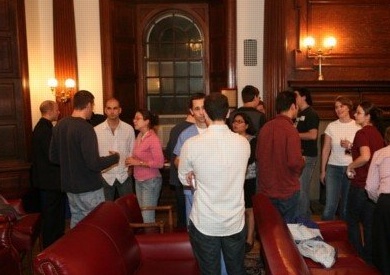
Oct 4:
We receive a great email: “At long last, the SSA can formally say ‘Yes, we’re coming to Harvard.'” It was our pleasure to work with the Secular Student Alliance throughout the year in planning our 30th Anniversary Conference. And we’re proud that Harvard now has more SSA members than almost any other school.
October 8:
“Jesus Camp” trip: the Harvard Secular Society arranges for a University grant enabling approximately 2 dozen group members take a trip over to the MIT area to see the noted new documentary, “Jesus Camp.”
Oct 10:
Michael Shermer: The Humanist Chaplaincy, along with the New England Skepical Society and the Humanist Association of Massachusetts, hosts renowned Skeptic and Humanist, Michael Shermer. Shermer, editor of the magazine Skeptic, spoke on his book, Why Darwin Matters: The Case Against Intelligent Design. Approximately 150 attended, and a signing and dinner with the author followed at popular local bar, Redline.
Oct 19:
Richard Dawkins comes to Cambridge on his The God Delusion book tour, and after a packed reading at First Parish Church, Dawkins joins the Harvard Humanist Graduate Community for an exclusive post-reading discussion.
Dawkins has very positive things to say about the experience in his blog. And Humanist Chaplain Greg Epstein has kind words for Dawkins as well.
Oct 26:
Julia Sweeney: Renowned Actress, Comedienne, Playwright and Humanist Julia Sweeney visits Harvard to perform her inspiring new play, Letting Go of God, for a huge crowd– 750 paid attendees – at Harvard’s prestigious Sanders Theatre.
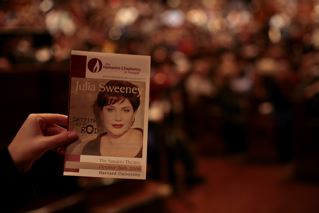 The audience, which marked the largest crowd Sweeney had ever performed the entire play for, was wowed. See the Harvard Gazette article. Undergraduate Julie Duncan’s review was distributed nationally and internationally in leading Humanist e-newsletters. For a photo essay of the almost supernaturally magical night: http://blogs.law.harvard.edu/humanism/2006/11/03/julia-sweeney-photos/
The audience, which marked the largest crowd Sweeney had ever performed the entire play for, was wowed. See the Harvard Gazette article. Undergraduate Julie Duncan’s review was distributed nationally and internationally in leading Humanist e-newsletters. For a photo essay of the almost supernaturally magical night: http://blogs.law.harvard.edu/humanism/2006/11/03/julia-sweeney-photos/
November 15:
Interfaith Thanksgiving Service: the Humanist Chaplaincy at Harvard and the Harvard Secular Society co-sponsor an Interfaith Thanksgiving Service in Harvard’s Memorial Church. The Humanist Chaplaincy is the first among Harvard’s 40 Chaplaincies, and one of only two, to provide significant funding in support of this first-ever at Harvard event which had participation from the Humanist, Hindu, Buddhist, Baha’i, Muslim, Jewish, and Christian communities. Secular Society President Amanda Shapiro and Humanist Chaplain Emeritus Tom Ferrick are among the speakers. Approximately 150 attend. For more: http://blogs.law.harvard.edu/humanism/2006/11/09/yet-some-more-upcoming-events/
November 16:
Special Lecture: “The Neuroscience of Moral Decision-making” by Harvard Professor Joshua Greene. Presented to a crowded Science Center lecture hall with the Center for Naturalism and the Humanist Association of Massachusetts.
November 24:
Robot Goes Here: Harvard Humanist Graduate Community Member David Rand‘s high energy electro rock project Robot Goes Here releases the album “The Byte Is In My Blood” on Infidel Records.
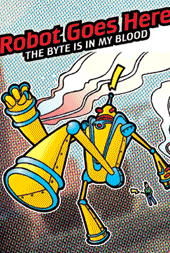 Mixed by Ray Martin (Gorillaz, Shakira, Mindless Self Indulgence) and Ted Young (Taking Back Sunday, Bouncing Souls, Andrew W K), the album lyrically tackles a wide range of big-pictures issues from a Humanist prospective while still being fun and making you dance. The album has been on NPR’s nationally syndicated Here and Now among other places, and one of its songs will be on millions of laptops sent to kids in developing nations as part of MIT’s One Child Per Laptop initiative. Check out the video for “What All The Screaming’s About” here.
Mixed by Ray Martin (Gorillaz, Shakira, Mindless Self Indulgence) and Ted Young (Taking Back Sunday, Bouncing Souls, Andrew W K), the album lyrically tackles a wide range of big-pictures issues from a Humanist prospective while still being fun and making you dance. The album has been on NPR’s nationally syndicated Here and Now among other places, and one of its songs will be on millions of laptops sent to kids in developing nations as part of MIT’s One Child Per Laptop initiative. Check out the video for “What All The Screaming’s About” here.
December 4:
Anthony Pinn & African American Humanism: For our 14th Annual Alexander Lincoln Memorial Lecture, we were delighted to initiate a partnership between the Humanist Chaplaincy at Harvard, and The Harvard DuBois Institute for African and African American Research, in presenting Harvard alumnus Dr. Anthony Pinn, the leading thinker of African American Humanism.
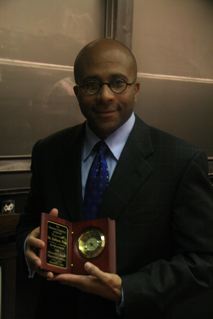
Pinn also took time out for a special luncheon with students from the Harvard Secular Society and the Harvard Black Students’ Association. For the Boston Globe’s write-up: http://www.boston.com/news/local/massachusetts/articles/2006/12/16/religion_professor_backs_atheistic_view/.
December 7:
The Humanist Grad Student Community ends the semester with a FESTIVUS (!) celebration.
January 16:
Dr. Herman Suit, Andres Soriano Distinguished Professor of Radiation Oncology at Harvard Medical School joins the board of directors (honorary) of the Humanist Chaplaincy at Harvard. This begins an expansion for the HCH board that has since added Steven Pinker and Amartya Sen, as well as Harvard College alumnus and labor lawyer Michael Felsen, ’71. The board plans to continue its expansion in ‘07-‘08.
February 5:
A new Humanist Chaplain, Dr. Anne Klaesen, is welcomed at New York’s Adelphi University.

Harvard Chaplain Greg Epstein was among those consulted on how to arrange for this new institution, along with Harvard Alumnus and Adelphi Associate Dean of Performing Arts Dr. Michael Stepniak. For more on the Adelphi Chaplaincy: http://www.ehsli.org/blogpage.php?blogid=109. More Humanist Chaplains at more schools may be on the way—a committee of national Humanist leaders has recently been formed to explore this possibility. To lend your support, email humanist@hcs.harvard.edu.
February 8:
www.thenewhumanism.org, the website for the Humanist Chaplaincy’s 30th anniversary conference, is launched. Over the next 10 weeks, 582 people from around the world would register on the site, including 282 students and young adults. 21 leading Humanist and related organizations also registered to take part in our Humanist Expo on Saturday April 21. These numbers overwhelmed our original expectations (almost no money was spent to advertise the conference or the website) and caused us to have to switch conference venues 3 times due to need for more space.
February 12:
‘A Toast to Darwin’/Darwin Day: Harvard Square’s popular bar, Redline, is packed full with Humanists, agnostics, and atheists of every age and background, for Darwin Day, an at times almost raucous “International Celebration of Science and Humanity.” The Humanist Chaplaincy at Harvard, the Center for Naturalism, and the Humanist Association of Massachusetts sponsored this gathering hosted by the CFN’s Director Tom Clark.

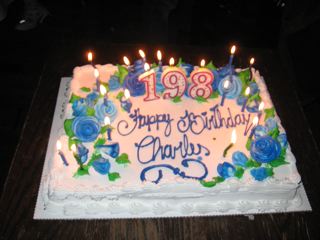
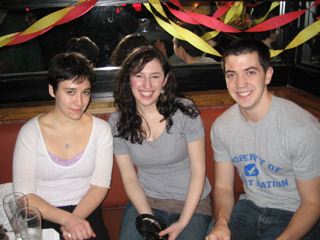
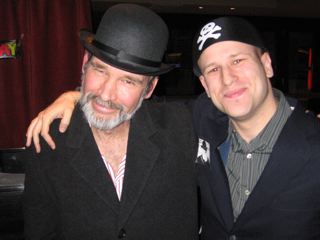

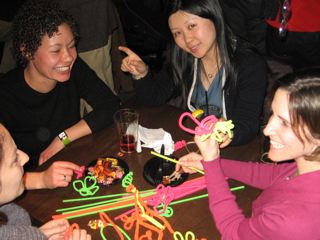
March 1:
Alumni Mailing campaign: The first ever campaign to officially organize Harvard Humanist, agnostic, atheist, and non-religious alumni began with a letter sent via US Postal Service.
Responses began to come in the very next day, including this one: “I cried (with joy and relief) when I received the letter from the Humanist Chaplaincy at Harvard. I wish I had known there was a Humanist Chaplaincy when I was there 1982-86, and am glad to have been reached out to.” Deborah Strod, ’86.
March 21:
Special Lecture: Marc Hauser, author, Professor, & co-director of the Mind, Brain, and Behavior Program at Harvard “Evolving a Universal Moral Grammar:The Natural Foundation of Right and Wrong”
March 30:
An Associated Press article, “Atheists Split Over Message,” centers on the Humanist Chaplaincy at Harvard. The article runs in dozens of newspapers worldwide, including the New York Times, Washington Post, the Guardian (UK), and more. The article describes how “Not all nonbelievers identify as humanists or atheists, with some calling themselves agnostics, freethinkers or skeptics. But humanists see the potential for unifying the groups under their banner, creating a large, powerful minority that can’t be ignored or disdained by mainstream political and social thinkers.” Chaplain Greg Epstein is quoted describing Humanism as a more welcoming, inclusive approach to philosophical naturalism than the media-dubbed phenomenon ‘The New Atheism:’ Humanism is not about erasing religion, he said. It’s an embracing philosophy…The philosophy of the future is not going to be one that tries to erase its enemies…The future is going to be people coming together from what motivates them.
April 8:
Harvard’s WHRB Radio does a great story on “The New Humanism”, featuring Amanda Shapiro, Humanist Chaplain Greg Epstein, and Hemant Mehta, President of the Secular Student Alliance and author of I Sold My Soul on eBay. Listen here.
April 20:
Harvard Divinity School student and Humanist Chaplaincy intern Mary Ellen Giess leads “Humanist Values in Action,” a new project wherein Harvard Humanist, agnostic, atheist & non-religious students connect with one another and give back to their local community and beyond, through volunteering projects and social justice work. The humbling opening project was a visit by a dozen students to Barbara McInnis House, a local health clinic for the homeless, where they did arts and crafts and played games with recovering patients.
April 20-22:
What can we say? Our 30th anniversary conference, “The New Humanism” was an amazing experience, and possibly the largest Humanist conference in the US, ever. We learned so much from this opportunity to host 1000+ “New Humanists,” among them novelist Salman Rushdie; Nobel laureate Amartya Sen; 2-time Pulitzer Prize Winner E.O. Wilson; 2006 American Humanist of the Year Steven Pinker; folk rock star Dar Williams; 2006 Candidate for US Senate (D-CT) Ned Lamont; Humanist Congressional Lobbyist Lori Lipman Brown of the Secular Coalition for America; Rabbi Sherwin Wine; Director of the Harvard-Yenching Institute and Professor Tu Weiming; Fred Edwords; Lou Appignani; Ambassador John Loeb Jr. ’52 ’54 (MBA); Ambassador Carl Coon ’49; novelist and philosopher Rebecca Goldstein; and many, many more. Among last-minute announcement surprise guests were world-famous lawyer and Harvard Law Professor Alan Dershowitz, who spoke stirringly to students about his passion for Humanism; and Professor Peter Gomes, Minister of Harvard’s Memorial Church and widely recognized as one of the “Best Talkers in America.” We surely could never have managed it all without our wonderful student volunteers: Brendan Randall, Hadas Edelman, Handan Titiz, Andy Connor, Alex Ellis, Dave Rand, Dan Berry, Julie Duncan, Zoe Kawaller, Anna Reinert, Sebastian Velez, Mary Ellen Giess, Peter Blake, and Amanda Shapiro, along with Registration Coordinator Joseph Pacatte.)
For conference recaps, see the Harvard Gazette and the Humanist Network News. For an incredibly thorough blog recap in four parts, complete with numerous photos, see British bloggers The Lunchtime Observers, parts 1, 2, 3, & 4. Click here for a photo essay of our opening event, which packed every one of the 1070 seats in Harvard’s Memorial Church, plus two additional rows placed in the front, and turned away dozens if not hundreds. (Thanks to Harvard Humanist graduate student and photographer Juliette Melton!)
April 24:
Harvard Humanist Graduate Community President Peter Blake appears in the Boston Globe, in response to a recent Op-ed:
“Jeff Jacoby is right to praise the efforts of religious leaders to improve the lives of others, but wrong to presume that non-believers make no similar efforts. Last weekend a conference at Harvard called “The New Humanism” brought together secular humanists, atheists, and freethinkers from across the globe, including Salman Rushdie and E. O. Wilson, to promote community outreach, compassion, and tolerance.
Our organizations prefer an inclusive approach, working with and learning from our religious peers, in order to improve the world. This is in stark contrast to the us vs. them mentality that Jacoby seems to advocate.
PETER R. BLAKE
Cambridge
May 9:
Dominican Republic School Building Project:

Harvard Humanist Graduate Community Member Sebastian Velez, of the Museum of Comparative Zoology, is featured by the American Humanist Association in a nationwide announcement of Velez’ new project, “of great significance to those who value educational opportunity for all as well as freedom of religion.”
Along the border of the Dominican Republic and Haiti–in a rural area beset by dire poverty, a total lack of educational opportunities, and a regressive economic system–Vélez is taking the lead in a school-building project. The school will start with grades one through four and currently needs a building for a library, among other improvements. Admission to the school is free, regardless of whether a child is “sponsored” or not. Donations in support of this Humanist Chaplaincy at Harvard-affiliated project can be made at the American Humanist Association’s Humanist Charities website.
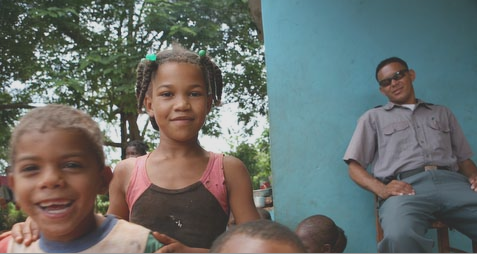
May ???:
A wonderful Celebration of our year’s many achievements!!
***
LOOKING FORWARD TO NEXT YEAR:
September: Expect a partial relaunch of www.harvardhumanist.org, featuring dramatically expanded multi-media, and many new features.
October: the 15th Annual Alexander Lincoln Memorial Lecture, featuring Rep. Pete Stark, the first openly Humanist member of Congress in US history. Featuring the Secular Coalition of America, the organization which organized this historic announcement.
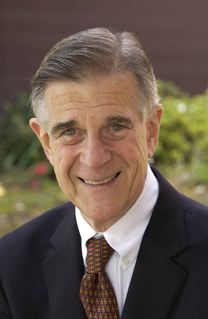
Exact date and location TBA.
SPRING Semester:
Harvard’s first-ever full credit course on Humanism, thanks in part to a grant from the Institute for Humanist Studies.
The second annual Outstanding Lifetime Achievement Award for Cultural Humanism, or ‘Rushdie Award.’ A committee is now being assembled to determine the awardee and organize the event. 
Possible awardees that have been mentioned so far include musicians Eddie Vedder, Michael Stipe, Ani DiFranco, and Greg Graffin; cyclist Lance Armstrong; artist Todd MacFarlane; and others. Who will it be? To help put this event together email humanist@hcs.harvard.edu.
THANK YOU SO MUCH TO EVERYONE WHO WAS INVOLVED THIS YEAR!! We hope you will join us as part of our growing community in the coming months. For suggestions of future events, or any other feedback, email humanist@hcs.harvard.edu.





 The audience, which marked the largest crowd Sweeney had ever performed the entire play for, was wowed. See the
The audience, which marked the largest crowd Sweeney had ever performed the entire play for, was wowed. See the 











